Best Hospitals for Pancreatic Cancer Treatment in India
Pancreatic cancer is responsible for almost a quarter of a million deaths every year around the world. This is the thirteenth most common type of cancer that affects the population worldwide. The pancreas is a thin pear-shaped gland in the abdominal cavity, between the stomach and the spine.
There are two important functions of the pancreas in our body– to secrete digestive juices to help break down the food and to make hormones that help regulate blood sugar levels.
Pancreatic cancer is a disease in which the cells of the pancreas start to grow uncontrollably, forming an abnormal mass of tumors. It can be malignant, which means the cancer cells can metastasize and cause cancer in other parts of the body.
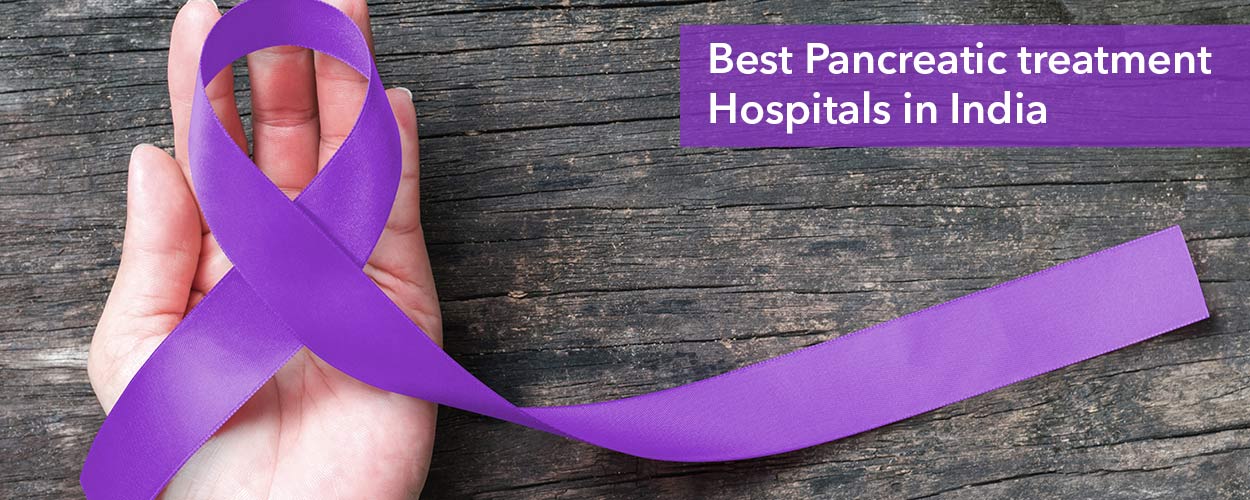
The condition can be severe at an advanced stage, possibly leading to multiple organ failures and death. Pancreatic cancer is mainly classified as exocrine or endocrine, on basis of the location of the tumor.
The tumor that begins within the pancreatic region where digestive juices are generated is known as exocrine tumors whereas exocrine tumors are the ones that develop in the pancreatic region responsible for hormone production.
Exocrine tumors are the most prevalent of all pancreatic cancers, accounting for almost 95% of all cases globally and the most common form of exocrine cancer is Pancreatic Adenocarcinoma. This is followed by Adenosquamous carcinoma, Squamous cell carcinoma and Giant cell carcinoma.
Get Free Assistance from Best Hospital for Pancreatic Surgery in India
Pancreatic cancer treatment in India
The treatment options for cancer of pancreas include surgery, chemotherapy, radiation therapy and targeted therapy. The patient will most likely receive a combination of these treatment options. The treatment plan is designed on the basis of various factors including:
- The type of tumor and its location in the pancreas
- The stage of cancer, essentially whether the disease has spread
- Patient’s age and overall health
As with most kinds of cancer, pancreatic cancer can be successfully treated only when diagnosed at an early stage, before cancer spreads to other parts of the body. The surgery is generally aimed at completely removing the tumor and when surgery is not possible, other treatments can be used to increase the lifespan and the quality of life.
Pancreatectomy Surgery: A pancreatectomy is a surgical procedure in which all or part of the pancreas affected by the cancer is removed. There are different types of pancreatectomy surgeries, depending on the parts of the pancreas removed, including pancreaticoduodenectomy or Whipple procedure, distal pancreatectomy, segmental pancreatectomy, and total pancreatectomy.
Whipple procedure: A complicated surgery, pancreaticoduodenectomy, also known as Whipple procedure, involves removing the pancreas’ head, the part of the small intestine called the duodenum, and parts of other nearby organs such as the stomach, and bile duct. During this procedure, the entire digestive system is reframed to allow the proper digestion of food.
Distal pancreatectomy: In this procedure, the elongated part of the pancreas, called the tail, is removed along with the spleen while the head of the pancreas is left intact.
Total pancreatectomy: This involves complete removal of the pancreas, spleen and parts of other nearby organs of the digestive system. It is performed when cancer has spread throughout the pancreas and there are multiple tumors.
Radiation therapy – It is a kind of cancer treatment in which high-energy x-rays or other types of radiation are used to kill the cancer cells or stop their growth. There are mainly two types of radiation therapy: External and Internal radiation therapy.
External radiation therapy involves the use of a machine placed outside the body to deliver radiation toward cancer. During internal radiation therapy, a radioactive substance is delivered directly into or near cancer by using needles, seeds, wires, or catheters. The choice of radiation therapy method depends on the type and stage of the patient’s cancer.
Chemotherapy: This cancer treatment involves the use of anti-cancer drugs to destroy tumors or stop the growth of cancer cells. Chemotherapy can be administered orally in form of tablets or through an IV line injected into a vein or muscle.
A patient might need one type of drug at a time or a combination of different drugs administered at the same time. A chemotherapy regimen usually comprises a specific number of cycles given over a period of time. There is a period of rest between the cycles. The number of cycles and combinations of drugs depends on the patient’s diagnosis and stage.
Adjuvant Therapy: It involves giving chemotherapy and radiation after pancreatic cancer removal surgery. Chemoradiation therapy is a combination of chemotherapy and radiation therapy which increase the overall effects of both treatments. Chemoradiation given after surgery aims to destroy any cancer cells left after the surgery and reduce the risk of cancer recurrence.
Neoadjuvant Therapy: A patient may receive chemotherapy and radiation therapy prior to the pancreatic cancer removal surgery. The purpose of this type of therapy is to reduce the tumor volume, which allows initially unresectable cancers to become resectable. It improves the results of the surgery and survival. Neoadjuvant Therapy involves giving a chemoradiation therapy before the surgery, to shrink the tumor.
Targeted therapy: In this treatment, cancer’s specific genes, proteins, or the tissue environment that contributes to cancer growth and survival, are targeted. The drugs used in targeted therapy specifically block the growth and spread of cancer cells while limiting damage to healthy cells of the body.
For patients with advanced-stage cancer, where it has spread to other organs, the doctor may suggest palliative care and treatments relieve the systems. The goal is to reduce pain and improve the quality of life for cancer patients. It can be the option for pancreatic cancer treatment stage 4 patients.
What are the stages of pancreatic cancer?
Similar to other malignancies, pancreatic cancers can also be classified into the following well-defined stages.
Stage 1: When a tumour is restricted to localized growth, i.e. about 2 cm to 4 cm and has not spread to the surrounding parts.
Stage 2: When a tumour has grown over 4 cm and is either limited within the pancreas or has spread to surrounding areas, but not to the distant parts.
Stage 3: When a tumour has invaded the major blood vessels around the pancreas but still not spread to the distant sites.
Stage 4: The tumour has spread to nearby as well as distant body parts.
Why choose pancreatic cancer treatment in India?
India is renowned for its advanced healthcare industry and is considered one of the top medical travel destinations across the world. Every year, numerous patients from different parts of the world travel to India on a medical visa for various kinds of treatment, including cancer care.
The country’s popularity as a medical tourism destination is attributed to a number of factors, including the world-class hospitals, highly skilled doctors, affordable cost of treatment and many more.
The low pancreatic cancer treatment cost in India is a major attraction for international patients. An international patient can expect a high standard patient care and reliable treatment at relatively lesser cost than other countries, such as the USA, UK, Germany, France and other European countries.
This enables a patient to save a significant amount of money on the overall treatment, without compromising on the quality of services and outcome of treatment.
The best hospitals for pancreatic cancer treatment in India are high-end healthcare facilities that offer all types of treatment options. These hospitals are marked for their clinical excellence and superior quality of services by national and international accreditation organizations such as the Joint Commission International (JCI) and National Accreditation Board for Hospitals and Healthcare providers (NABH).
The specialists working at these hospitals have many years of experience of managing normal to complex cancer cases. Indian doctors are widely known for their extensive knowledge and skills in the field of medicine.
Here is a list of Best Hospitals for Pancreatic Cancer Treatment in India
1. Medanta – The Medicity, Gurgaon
CH Baktawar Singh Road, Sector 38, Gurugram, Haryana – 122001
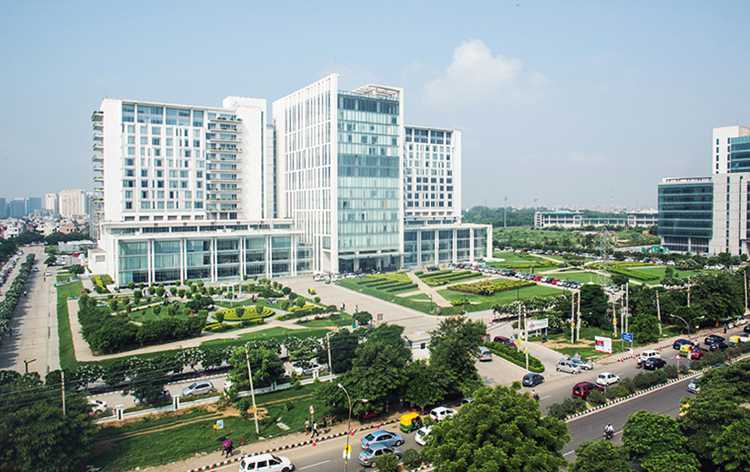
- Medanta – The Medicity is a top-rated medical center for pancreatic cancer treatment in India. The hospital is one of the largest facilities in the Delhi-NCR and has a dedicated cancer center to deliver the best possible care to cancer patients.
- The Gastrointestinal Surgery, Oncology, and Bariatric Surgery division of Medanta’s Digestive and Hepatobiliary Sciences Institute is equipped with the latest surgical equipment for all kinds of Gatrointestinal, Hepatobiliary, and Pancreatic procedures.
- It offers the most updated diagnostic technology, including the Computed tomography (CT) scan, Positron emission tomography (PET) scan, Endoscopic retrograde cholangiopancreatography (ERCP), Percutaneous transhepatic cholangiography (PTC) and others. This enables the doctors to make a definitive diagnosis and accurate staging for cancer, allowing the team of oncologists to formulate an effective treatment plan.
- Medanta has a team of highly reputed and experienced cancer specialists in the field of surgical oncology, medical oncology and radiation oncology. These oncologists work together with gastrointestinal specialists and other experts to provide a tailor-made comprehensive treatment plan for the patient.
2. Fortis Memorial Research Institute, Gurgaon
Opposite HUDA City Centre, Sector 44, Gurugram, Haryana – 122002
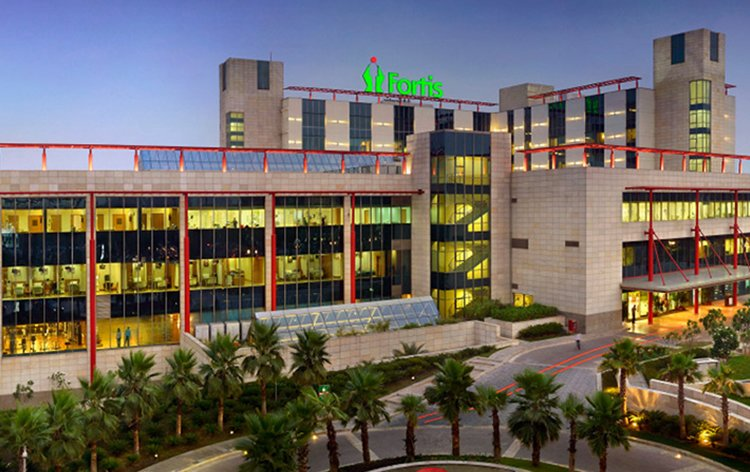
- FMRI is one of the largest medical centres in the National capital region that offers a broad range of facilities for multiple specialities under one roof.
- The hospital is known for its international standard infrastructure, high-end technology, the superior quality of patient care services and excellent outcome record.
- The Department of Oncology at Fortis Memorial Research Institute (FMRI) is a committed facility for comprehensive cancer care.
- The department has is a dedicated 20-bedded Chemo Daycare unit and the most updated technology for cancer treatment such as Elekta Axesse for radiation therapy & Da Vinci Robot for minimally invasive cancer Surgeries.
- The oncology department is supported by a fully established Psycho-Oncology Programmes including support groups and expressive therapies for patients as well as their families.
- FMRI’s Department of Hepato-Pancreato-Biliary Surgery is also involved in providing an effective treatment plan and diagnosis for pancreatic cancer patients.
- The panel of oncologists and surgical teams offer conventional open and modern minimally invasive surgery for surgical management of pancreatic diseases including pancreatitis and pancreatic cancer.
- FMRI is a tertiary level referral centre and the oncology department efficiently manages complicated cases on a regular basis.
3. Dharamshila Narayana Super Specialty Hospital
Vasundhara Enclave, Near New Ashok Nagar Metro Station, Dallupura, New Delhi, Delhi – 110096
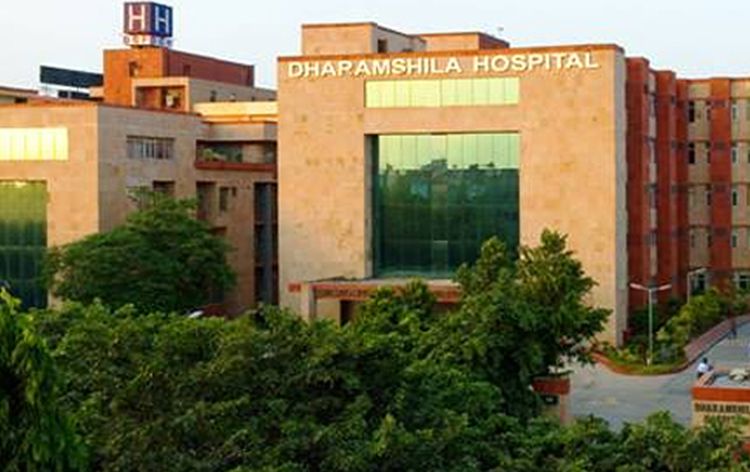
- Dharamshila Narayana Superspeciality Hospital ranks amongst the top cancer hospitals in India and is the most trusted centre for oncology care.
- The Gastrointestinal Cancer Centre at the Dharamshila Narayana has extensive experience of over 20 years of treating various kinds of gastrointestinal cancers and complex cases. This centre is an exclusively dedicated facility for patients suffering from gastrointestinal cancers including Stomach Cancer, Pancreatic Cancer, Liver Cancer, Esophageal Cancer, Colorectal Cancer, Anal Cancer, and others. It is a centre of excellence and is widely known for its outstanding treatment outcomes.
- They offer a comprehensive oncology program for diagnosis and treatment of gastrointestinal cancers, including complex operation and Chemo-Radiation therapy for pancreatic cancer.
- The centre has a dedicated GI Endoscopy Unit equipped with modern technologies such as Endoscopic Ultrasound and Advanced interventional endoscopy procedures for evaluation of cancer in specific locations. They also offer high-tech facilities for cancer diagnosis and staging, including High-Resolution CT Scanning, Positron Emission Tomography (PET), and Fine Needle Aspirations/Biopsies.
- The team of cancer experts at Dharamshila Narayana provides complete and personalized care for the patients. Their unsurpassed knowledge and experience, along with a compassionate approach for each patient, make them the best pancreatic cancer doctors in India.
- There are special patient coordinators for cancer patients and their family, who address all their concerns about the treatment. The hospital also offers palliative care and pain management services to patients with advanced-stage cancer, which aims to improve their quality of life.
Get Free Assistance for Best Pancreatic Cancer Hospital in India
4. Max Super Specialty Hospital, Delhi
Press Enclave Road, Mandir Marg, Saket, New Delhi – 110017
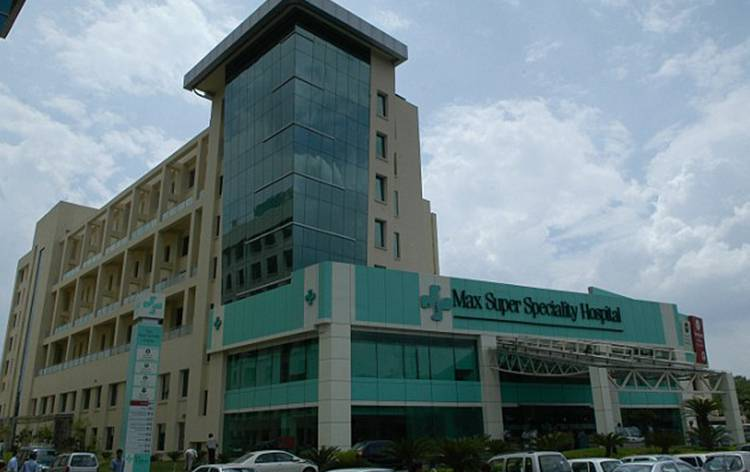
- Max Super Specialty Hospital, Saket is a JCI accredited multi-specialty hospital that caters to a large volume of domestic and international patients every year.
- Max Institute of Cancer care (MICC) is a one-stop destination for comprehensive oncology services, including screening, diagnosis, staging, treatment and palliative care for cancer patients. It is a designated center of excellence that provides international standard healthcare services.
- The Department of Surgical Gastroenterology at Max Hospital is a state-of-the-art facility, equipped with cutting-edge technology for surgery. They have incorporated the best clinical practices and offer advanced surgical procedures including minimally invasive robot-assisted surgery for effective management of pancreatic diseases and the best possible outcomes. The minimally invasive surgical techniques including robotic assisted surgery is used for various types of pancreatic surgery, including Whipple’s procedure, which enables a faster recovery and less post-operative pain.
- The hospital has a Disease management group (DMG) for Breast, Gynaecology, gastrointestinal cancers. This group comprises a team of specialists from different branches including medical oncologists, radiation oncologists, surgeons, gastroenterologists, interventional radiologists, nuclear medicine specialists, dieticians, physiotherapists and others. They all work in synergy to deliver an individualized treatment plan for each patient.
5. BLK Super Specialty Hospital
Pusa Rd, Radha Soami Satsang, Rajendra Place, New Delhi, Delhi 110005
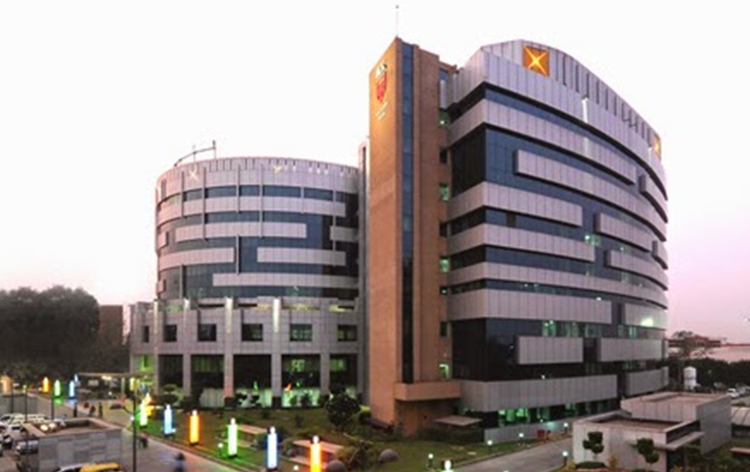
- BLK Super specialty Hospital is a leading tertiary care facility in the country, that provides a wide range of services across various specialties.
- The BLK Cancer Centre offers a holistic treatment program for diagnosis, staging, treatment and palliative care of cancer patients. This Centre has a division for GI Cancer program for the treatment of various kinds of pancreatic and gastrointestinal cancers.
- The cancer centre is equipped with top-notch diagnostic and therapeutic facilities for oncology services. Each patient’s case is evaluated by a multidisciplinary team of highly skilled oncologists (Surgical, Medical and Radiation) who work with gastroenterologists and other specialists. They offer a comprehensive multi-specialty treatment plan with a personalized path for the most effective treatment.
- The Centre keeps updating its technologies for cancer diagnosis and treatment, to ensure that the patients received advanced cancer care.
6. Kokilaben Dhirubhai Ambani Hospital, Mumbai
Rao Saheb Achutrao Patwardhan Marg, Four Bunglows, Andheri (West), Mumbai – 400053
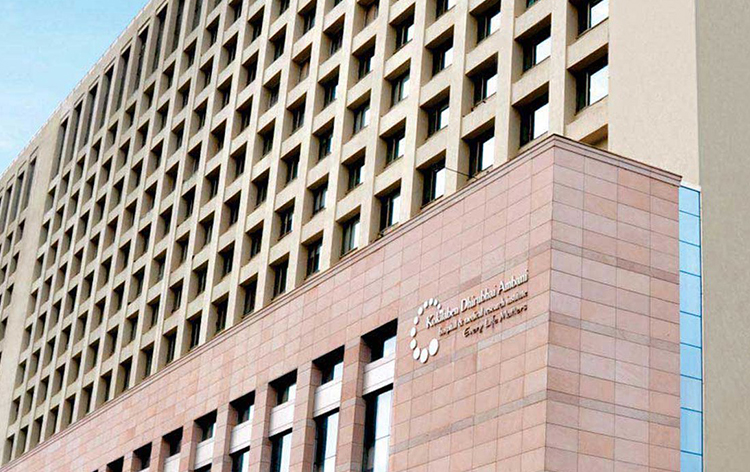
- Kokilaben Dhirubhai Ambani Hospital & Medical Research Institute is one of the best hospitals for pancreatic cancer treatment in India. It is an advanced healthcare facility with outstanding infrastructure and excellence in clinical services, diagnostics and research studies.
- The Centre for Cancer at KDAH offers an integrated approach for cancer care, combining the expertise of the specialists with high-end technology support. The comprehensive and coordinated care provided to each cancer patient improve the outcome of the treatment.
- They offer a broad range of cancer services, including multidisciplinary approach for treatment, counselling/public education for patients as well as their families, screening, diagnosis, combination of treatment, pain management and palliative care.
- The hospital has the latest surgical technology for pancreatic cancer treatment – the robotic minimally invasive surgery with the da Vinci Xi® system. Surgery is the best chance for the treatment of proximal and distal parts of the pancreas. There is a facility for pain control and palliative treatment, which is an important part of treatment for several patients. Other options for patients with advanced tumours include endoscopic stenting (for management of jaundice and vomiting), chemotherapy and radiotherapy.
- The cancer centre has a dedicated Day Care Chemotherapy Unit which provides cancer therapy on an outpatient basis. Some advanced radiation therapy systems at Kokilaben include Trilogy for radiotherapy and Novalis Tx for radiosurgery.
7. Gleneagles Global Health City
439, Medavakkam Road, Perumbakkam, Cheran Nagar, Chennai, Tamil Nadu 600100
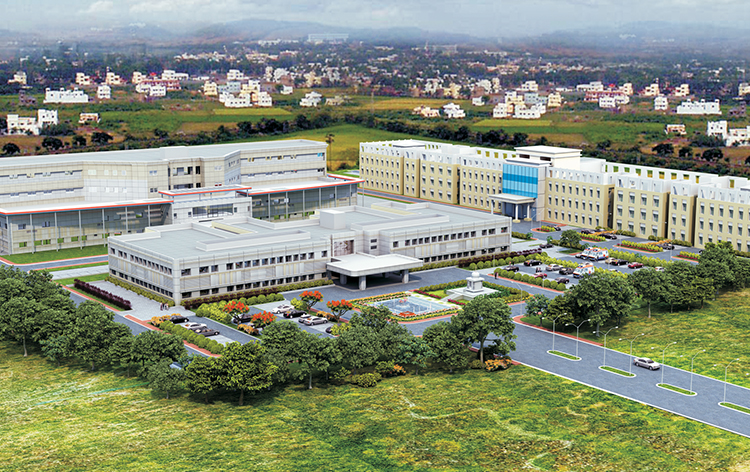
- Global Hospital is one of the best pancreatic cancer hospitals in Chennai, that offers first-class services to domestic as well as international patients.
- The hospital has specialized divisions for different oncology services, including surgical oncology, medical oncology and radiation oncology. The team of specialists in the divisions are reputed doctors with rich clinical experience in treating various kinds of cancer. They work together with GI specialists and other doctors to provide patients with a multidisciplinary treatment plan for their cancer.
- The cancer centre at Global Health City is equipped with advanced equipment for complex surgical procedures, and effective tumor removal and recovery. The department of Radiation oncology has a variety of new-age technology systems for safe and precise delivery of radiation dosage.
- The exclusive daycare chemotherapy unit of the hospital enables patients to receive treatment without hospitalization.
What are the types of pancreatic cancer?
The two main types of pancreatic cancers are exocrine cells and endocrine cells. Both these types of cancers of the pancreas can be distinguished on the basis of their own risk factors and causes, different signs/symptoms, diagnosis based on different tests, varied treatment options, and different outlooks.
Exocrine tumors: This is the most common type of pancreas cancer. It includes:
Pancreatic adenocarcinoma: An adenocarcinoma is a type of cancer that develops in gland cells of an organ. Almost 95% of cancers of the exocrine pancreas are pancreatic adenocarcinomas. It usually starts in the ducts of the pancreas, but may sometimes they originate from the cells responsible for producing pancreatic enzymes (this is known as acinar cell carcinomas).
Other less common types of the exocrine pancreatic cancers include adenosquamous carcinomas, signet ring cell carcinomas, squamous cell carcinomas, undifferentiated carcinomas and undifferentiated carcinomas with giant cells. These types are classified on the basis of their appearance under the microscope.
Solid pseudopapillary neoplasm (SPN): This is a rare type of slow-growing tumors that typically occurs in young women. The best treatment for this cancer is surgery and the outlook is generally very good.
Endocrine tumours: These are far less prevalent than exocrine tumours, and account for less than 4% of all pancreatic cancers. They are also known as pancreatic neuroendocrine tumours (NETs) or islet cell tumours. Endocrine tumour can be benign or malignant (cancerous).
Non-functioning tumours: These types of tumours don’t cause production of enough excess hormones to cause symptoms. As they don’t make excess hormones for symptoms, they might go undetected until the tumour has grown quite large.
Carcinoid tumours: These are another type of pancreatic neuroendocrine tumours (NETs) that rarely begin in the pancreas. However, they are much more common in other parts of the digestive system. These tumours often secrete serotonin or its precursor molecule.
Symptoms of pancreatic cancer:
People with pancreatic cancer may not experience symptoms at an early stage or sometimes the symptom may be caused by a different medical condition, other than cancer. Some common symptoms or signs of pancreatic cancer include the following:
- Jaundice: involves yellowing of the skin and eyes. It is usually the first sign observed in a pancreatic cancer patient. Other signs of jaundice that occur due to blockage of the bile ducts include dark colour urine, itching on the skin, and clay-coloured stool.
- Pain in upper part of abdomen or back
- Swelling and pain in an arm or leg due to a blood clot – deep vein thrombosis
- Gastrointestinal symptoms such as heart burn or burning feeling in stomach
- Stomach bloating
- Gallbladder or liver enlargement as the cancer may block the bile duct, resulting in build up of bile in the gallbladder. It can be felt as a large lump under the right side of the ribcage during a physical exam.
- Floating stools with a bad odour and an unusual colour as the fats are not properly digested by the body
- Weakness, fatigues, loss of appetite and nausea
- Chills and Fever
- Unexplained and sudden weight loss

